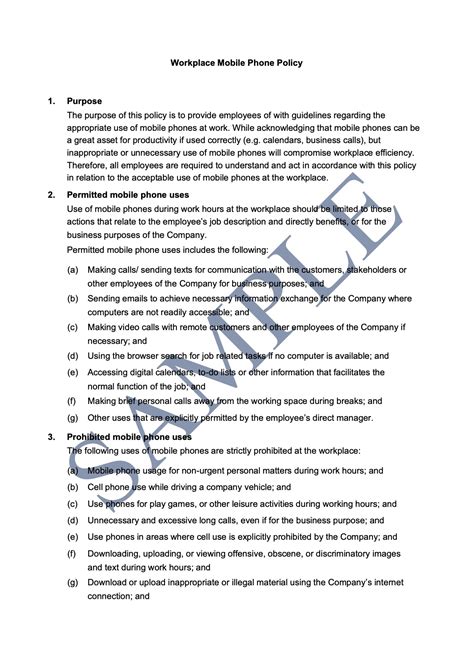Mobile Phone Policy Sample

The widespread use of mobile phones has transformed the way we communicate, both personally and professionally. With the constant connectedness provided by these devices, it's essential for organizations to establish clear guidelines on their use in the workplace. A well-structured mobile phone policy not only helps in maintaining productivity but also ensures the security and integrity of company data. This article aims to provide a comprehensive overview of what a mobile phone policy should entail, focusing on key aspects such as personal use, company-provided devices, security measures, and compliance with regulatory requirements.
Key Points
- Developing a clear and comprehensive mobile phone policy is crucial for maintaining workplace productivity and data security.
- Personal use of mobile phones during work hours should be regulated to minimize distractions and ensure employees meet their job requirements.
- Company-provided devices come with specific usage guidelines to protect company data and maintain professional communication standards.
- Implementing robust security measures is essential to prevent data breaches and protect sensitive company information.
- Regular reviews and updates of the mobile phone policy are necessary to keep pace with technological advancements and changing regulatory requirements.
Understanding the Need for a Mobile Phone Policy

Given the ubiquitous nature of mobile phones, it’s imperative for employers to acknowledge the potential benefits and drawbacks of their use in the workplace. On one hand, mobile phones can enhance flexibility, improve communication, and increase productivity. On the other hand, unregulated use can lead to decreased focus, compromised data security, and potential legal issues. A mobile phone policy serves as a guide, outlining acceptable use, responsibilities, and consequences of misuse, thereby fostering a responsible and secure mobile device environment.
Personal Use of Mobile Phones
One of the critical components of a mobile phone policy is the regulation of personal use during work hours. This includes guidelines on making and receiving personal calls, texting, browsing the internet, and using social media. Employers should strike a balance between allowing some personal use to maintain employee morale and minimizing distractions that could impact productivity. For instance, personal use might be restricted to designated break times or areas where it does not interfere with work activities. It’s also essential to communicate these guidelines clearly to all employees, ensuring they understand the expectations and potential disciplinary actions for non-compliance.
Company-Provided Devices

For employees provided with company mobile devices, the policy should clearly outline the terms of use. This includes the purpose of the device (e.g., work use only, or a blend of work and personal use), how to report lost or stolen devices, and the procedures for maintaining device security. Employers must also consider the Bring Your Own Device (BYOD) policy, which allows employees to use their personal devices for work purposes, and ensure it aligns with the company’s overall mobile device strategy. Security and privacy are paramount concerns in this context, requiring the implementation of robust measures such as encryption, password protection, and remote wipe capabilities in case a device is lost or compromised.
Security Measures and Compliance
A critical aspect of any mobile phone policy is the inclusion of stringent security measures to protect company data. This involves requiring strong passwords, enabling two-factor authentication where possible, and ensuring all company data is encrypted. Employers must also comply with relevant data protection regulations, such as the General Data Protection Regulation (GDPR) in the European Union or the California Consumer Privacy Act (CCPA) in the United States. Regular monitoring and audits can help identify vulnerabilities and ensure compliance with these regulations, safeguarding against potential legal and reputational risks.
| Security Measure | Description |
|---|---|
| Password Protection | Requiring complex and regularly updated passwords for all devices and accounts. |
| Encryption | Ensuring all company data stored on or transmitted by mobile devices is encrypted. |
| Remote Wipe | Having the capability to remotely erase data from lost or stolen devices to protect sensitive information. |

Implementation and Enforcement
Effective implementation and enforcement of the mobile phone policy are crucial for its success. This involves communicating the policy clearly to all employees, providing training on its key components, and ensuring that disciplinary actions for non-compliance are fair, consistent, and well-communicated. Employers should also establish a system for reporting violations and for reviewing and updating the policy as necessary. Feedback from employees can be invaluable in identifying areas for improvement and in fostering a culture of compliance and responsibility.
Future Considerations
As technology continues to evolve, mobile phone policies must adapt to address new challenges and opportunities. This includes considerations for emerging trends such as the Internet of Things (IoT), 5G networks, and advanced mobile security threats. Employers must stay informed about the latest developments and regulatory changes, updating their policies accordingly to maintain relevance and effectiveness. By doing so, organizations can leverage the benefits of mobile technology while minimizing its risks, ultimately enhancing their operational efficiency, employee satisfaction, and competitive edge.
What are the key components of a mobile phone policy?
+A comprehensive mobile phone policy should include guidelines on personal use, company-provided devices, security measures, compliance with regulatory requirements, and procedures for reporting and addressing violations.
How often should a mobile phone policy be reviewed and updated?
+Given the rapid pace of technological change and evolving regulatory landscapes, it's advisable to review and update the mobile phone policy at least annually, or as needed based on significant changes in the organization or its operating environment.
What role do employees play in the enforcement of the mobile phone policy?
+Employees are crucial in the enforcement of the mobile phone policy. They must be aware of and comply with the policy's guidelines, report any violations or concerns, and participate in training and feedback sessions to ensure the policy's effectiveness and continuous improvement.
Meta Description: Develop a comprehensive mobile phone policy to enhance workplace productivity, ensure data security, and comply with regulatory requirements. Learn about key components, implementation strategies, and the importance of continuous updates and employee engagement.


